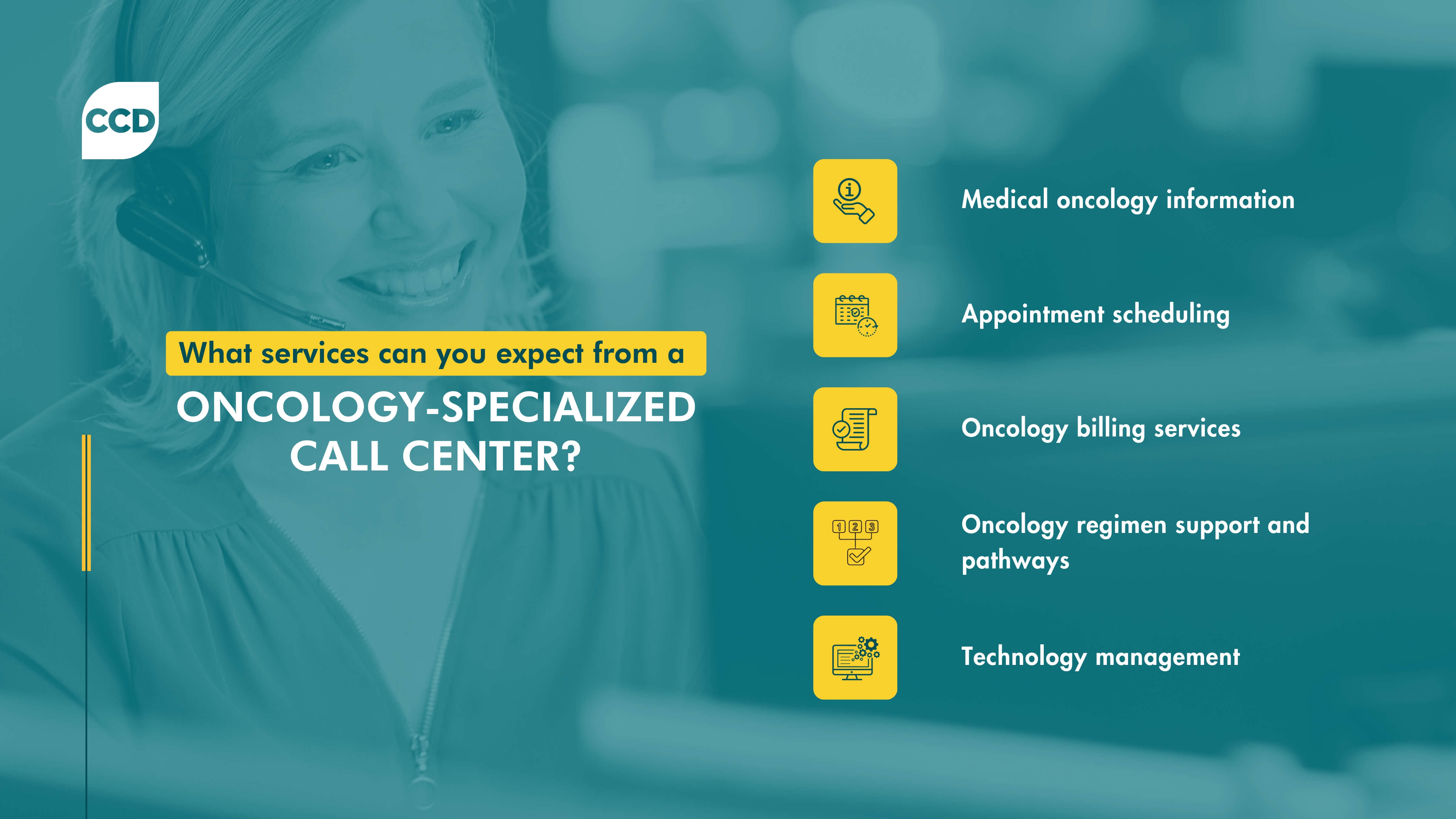More than 80 percent of cancer care is delivered in outpatient settings. This figure is not just a number; it represents a significant change in how medical oncology facilities approach and deliver cancer treatment and the third-party services they use to focus on providing quality care without compromising operational efficiency.
Oncology call centers are specialized facilities that offer round-the-clock support to cancer patients and their families. Staffed with a dedicated team of medical professionals, oncology call centers provide a broad range of services, including medical advice, support, and information dissemination. These services are tailored to meet the unique needs of cancer patients.
Oncology-specialized call center: workforce training and skillset
Oncology-specialized call center agents are responsible for scheduling appointments, managing patient inquiries, and ensuring a seamless experience for individuals dealing with cancer's emotional and often life-altering aspects. To excel in this role, they require a specific skill set and training encompassing medical knowledge, practical communication skills, and compassionately handling emotional distress.
1. Understanding oncology terminology
Oncology scheduling involves interactions with cancer patients, their families, and medical professionals. Schedulers must be well-versed in oncology terminology to comprehend the nuances of the medical condition, treatment options, and possible side effects. This knowledge ensures that they can accurately schedule appointments and address patient queries.
2. Awareness of treatment protocols
Oncology treatment protocols can vary significantly depending on the type and stage of cancer. Call center schedulers should understand the treatments available, such as chemotherapy, radiation therapy, and immunotherapy. They need to know which treatments require multiple appointments, potential side effects, and the overall duration of each treatment course.
3. Active listening
Effective communication begins with active listening. Call center schedulers must listen carefully to patients' concerns, questions, and emotions. This helps them comprehend their needs and ensure they receive the necessary support and guidance.
4. Empathy
Dealing with cancer patients and their families often involves highly emotional and distressing situations. Schedulers should empathize and understand these individuals' emotional challenges and stress. Compassion and empathy can significantly impact the patient's overall experience.
5. Clear and concise communication
Schedulers must provide patients with clear and concise information, ensuring they understand appointment details, treatment instructions, and follow-up requirements. Clear communication helps minimize patient anxiety and confusion.
On the other hand, conflict may arise when appointments need to be rescheduled, or there needs to be more clarity. Schedulers should be trained in conflict resolution techniques, ensuring patients' concerns are addressed professionally and amicably.
6. Resources and support services
Scheduling staff should be well-informed about available resources and support services for cancer patients, including support groups, financial assistance programs, and counseling services. They can then guide patients to these resources as needed.
Oncology specialized call center schedulers' training and skillset are critical in ensuring patients receive the necessary support and care throughout their cancer journey.

What services can you expect from a Call Center specialized in Oncology?
Medical oncology information
One of the primary services a specialized Oncology Call Center provides is disseminating medical oncology information. Cancer can be a complex and overwhelming diagnosis, and patients and their families often have numerous questions about their condition, treatment options, and side effects. Call center staff are well-trained to provide accurate and up-to-date information on various aspects of oncology, such as:
- Treatment options: support specialists can explain different treatment modalities, including chemotherapy, radiation therapy, immunotherapy, and targeted therapy.
- Side effects: They can inform patients about potential side effects associated with cancer treatments, helping individuals prepare for and manage these effects.
- Clinical trials: Oncology call centers may have access to information about ongoing clinical trials, providing patients with opportunities to explore innovative treatment options.
- Cancer resources: Patients can be directed to valuable resources such as patient support groups, cancer organizations, and educational materials.
Appointment scheduling
Efficient appointment scheduling is crucial in oncology, where timely care can significantly impact patient outcomes. Specialized Oncology Call Centers offer a seamless scheduling service that ensures patients receive the appropriate care when needed. Key features of this service include:
- Coordinating appointments: Call center staff work closely with medical professionals to arrange appointments for diagnostic tests, consultations, treatments, and follow-up visits.
- Patient convenience: Schedulers strive to accommodate patient preferences and geographical locations, allowing individuals to access the necessary care.
- Reminders and follow-ups: Patients are often provided with appointment reminders to reduce the risk of missed appointments, enhancing the continuity of care.
Oncology billing services
Navigating the complex world of healthcare billing, particularly in oncology, can be daunting. Specialized Oncology Call Centers often offer billing services to help patients and healthcare providers manage the financial aspects of cancer care. These services encompass:
- Insurance verification: Call center staff can verify patients' insurance coverage, ensuring they know what is covered and any potential out-of-pocket expenses.
- Assistance with claims: The center can help patients submit insurance claims and navigate the claims process, reducing the administrative burden on individuals and healthcare facilities.
- Financial counseling: Patients may receive guidance on financial assistance programs, copay support, and other resources to alleviate the financial burden of cancer treatment.
Oncology regimen support and pathways
Specialized Oncology Call Centers offer invaluable support in managing oncology-specific treatment regimens and care pathways. This service involves:
- Regimen Management: Call center staff works closely with oncologists and other healthcare providers to ensure patients receive the appropriate chemotherapy, immunotherapy, or radiation therapy regimens tailored to their cancer diagnosis and stage. This includes scheduling treatment sessions, monitoring dosage adjustments, and addressing side effects.
- Care Pathways: Oncology care often follows specific clinical pathways. Call center teams help guide patients through these, ensuring they receive care in a timely and coordinated manner. This approach optimizes the treatment process and minimizes disruptions in care.
Medical Oncology technology management
Managing and coordinating the technology used in outpatient oncology care is pivotal in improving the patient experience and ultimately enhancing cancer treatment outcomes.
Electronic Health Record management
- Data Integration: Call centers integrate patient information from various sources, ensuring healthcare providers access comprehensive and up-to-date medical records. This integration minimizes the risk of errors and facilitates accurate decision-making.
- Real-Time Access: EHRs and EMRs provide healthcare professionals with real-time access to patient records, allowing them to make informed decisions swiftly. This is particularly vital in oncology, where timely intervention is critical.
- Billing and Coding Support: EHR systems often incorporate billing and coding support, helping streamline the financial aspects of cancer care and reducing administrative burdens.
Patient Portal
A patient portal is an essential feature of Outpatient Oncology Technology Management. It is a secure and convenient platform for patients to access their medical information, communicate with their healthcare team, and actively participate in their care. Some of the benefits of a patient portal include:
- Access to medical records: Patients can view their medical records, test results, and treatment plans, promoting transparency and understanding of their condition and treatment.
- Secure Messaging: The patient portal enables secure communication with healthcare providers, allowing patients to ask questions, request prescription refills, or report side effects.
- Appointment scheduling: Patients can use the portal to schedule appointments, reducing the need for phone calls and simplifying the care access process.

The Impact of Oncology Call Centers on Cancer Patient Support
1. Improved patient experience
Oncology call centers enhance patient experience by providing a responsive and compassionate support system. Patients and their families feel reassured, knowing that help is just a phone call away. This, in turn, improves patient satisfaction and engagement with their treatment plans.
2. Reduced hospital admissions
Timely advice and support from oncology call centers can prevent unnecessary hospital admissions. Patients can address concerns, manage symptoms, and make informed decisions about their care, ultimately reducing the strain on hospital resources and healthcare costs.
3. Reduced costs for patients
The financial burden of cancer care can be overwhelming. An oncology-specialized support specialist can help make the process more accessible and understandable through:
- Insurance guidance and verification: Oncology call Centers are well-equipped to assist patients in understanding their insurance coverage and navigating the complex world of healthcare billing. This transparency lets patients plan their finances more effectively and avoid unexpected financial shocks.
- Financial assistance programs: Specialized call centers often have access to information about various financial assistance programs and resources available to cancer patients. They can guide patients in applying for these programs, helping to offset the costs of treatments, medications, and other related expenses.
- Billing support: through assistance with claims and disputes, support specialists can help patients navigate the often complicated billing process, reducing the likelihood of errors and helping to minimize out-of-pocket costs.
- Reducing missed appointments: Patients can make the most of their treatments through appointment reminders and convenient scheduling options and avoid rescheduling costs or gaps in care.
4. Reduced costs for payers
The impact of Oncology Call Centers on cancer patient support isn't limited to patients alone; it also extends to payors, such as insurance companies and healthcare providers. These call centers play a role in reducing costs for payors in several ways:
- Preventing treatment interruptions: patients who receive their treatments as scheduled help healthcare providers avoid costly complications, disease progression, and the need for more aggressive or expensive interventions.
- Streamlined billing: accurate billing reduces administrative overhead and ensures that payors are billed correctly, preventing disputes and costly claims processing.
- Data-driven decisions: analyzing patient outcomes, resource utilization, and performance benchmarks helps oncology outpatient centers identify areas for improvement and cost reduction.
Oncology Specialized call center services extend beyond medical guidance, encompassing emotional support, resource provision, and accessibility. Technology integration and healthcare expertise also ensure patients receive timely and accurate information, streamlining care coordination.
At CCD Health, we aim to pave the way so centers can concentrate on providing excellent cancer care. Our commitment to optimizing patient access and specialized approach to scheduling and outpatient services help your practice stay efficient and profitable.
Visit our healthcare-specialized call center service page today and discover the difference we can make in your day-to-day operations.